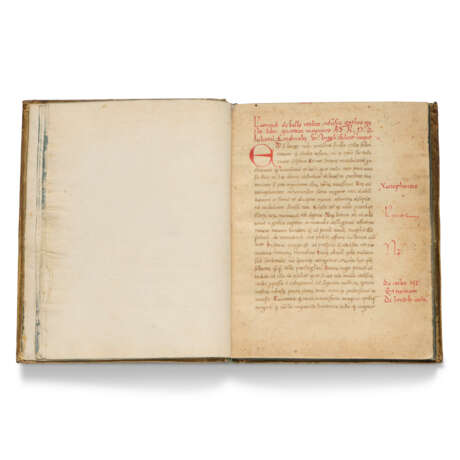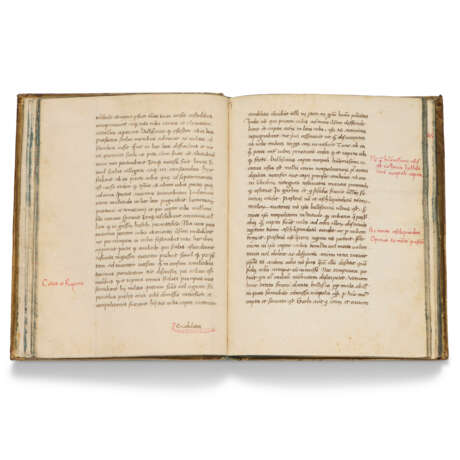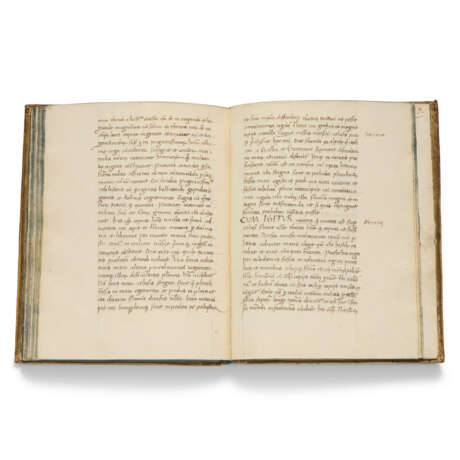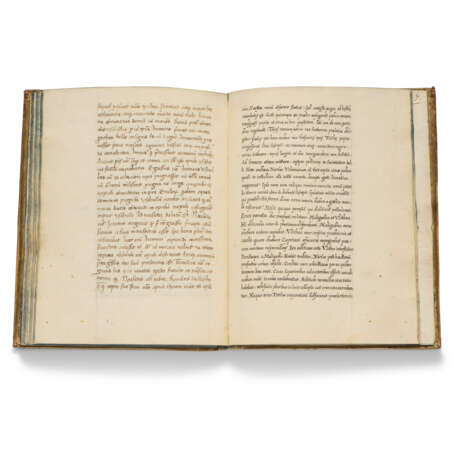ID 1249844
Lot 27 | Leonardo Bruni (1369–1444)
Estimate value
£ 10 000 – 15 000
De bello Italico adversus Gothos libri IV, in Latin, manuscript on paper [Italy, 15th century]
'A brazen attempt at high-handed literary theft': a humanist copy of Bruni's 'adaptation' of Procopius' history of the battles for the possession of Italy between the Romans and the Goths.
c.187 × 145mm. viii + 82 + ii leaves, ruled in leadpoint for 25 lines per page, c.140 × 85mm, complete, collation: 110, 2–712, catchwords throughout; written in humanistic script with incipits in capitals, the first rubric in red, blank spaces for others, side-notes in red as far as f.24r, sometimes slightly cropped; apparently left unfinished by the original scribe and so ff.79r–82r provided by a second scribe of uncertain (16th-century?) date; one three-line red initial, f.1r, spaces for others left blank; bound in undecorated 18th(?)-century vellum over pasteboards, marbled endpapers, the spine blank and with no raised bands.
Provenance:
(1) ? A member of the Maffei family of Verona (cf. below): Verona is noted in the margins three times by a 17th(?)-century reader (ff.46 and 78).
(2) Abbé Luigi Celotti (1759–1843), of Venice (on whom see Anne-Marie Eze, ‘Abbé Luigi Celotti (1759–1843): Connoisseur, Dealer, and Collector of Illuminated Miniatures’ (PhD Thesis, London, 2010), and ‘Abbé Celotti and the provenance of Antonello da Messina’s ‘The condottiere’ and Antonio de Solario’s ‘Virgin and Child with St John’, Burlington Magazine, 151 no. 1279 (2009), pp. 673–77): his sale at Sotheby’s, A Catalogue of the Hebrew, Greek, and Latin Antient Manuscripts, the property of the Abbé Celotti … Chiefly Collected from the Illustrious Families of … Maffei of Verona …, 14 March 1825, lot 41, with a clipping from the catalogue stuck to f.i verso.
(3) John Cochran, A Catalogue of Manuscripts in Different Languages [...] of Various Dates, from the Twelfth to the Eighteenth Century [...] (London, 1829), no. 155.
(4) William van Mildert (1765–1836), Bishop of Durham, sold by his executors at Evans’s, London, 21–27 July 1838, on the 6th day of the sale, as recorded on f.ii.
(5) “Mrs Watts”, inscribed on the verso of the last flyleaf.
(6) Unidentified owner, with their loosely-inserted brief typescript description in Swedish.
Content:
The text opens with a three-line rubric: ‘Leonardi de bello italico adversus gothos gesto libri quattuor incipiunt Ad .R.P.D. Iuliani Cardinalem .S. Angeli: feliciter incipit.’, dedication, ‘Etsi longe mihi iocundius fuisset […] huic potissimum assumemus’, and (f.2r) the main text, ‘[Z]enone Romano principe imperante Gothi […] Quo facto Cumas ac cætera oppida quæ supererant Narses recepit. Finisque fuit anni decimioctavi huius belli.’
Leonard Bruni (who was born in Arezzo, and therefore often known as Leonardo Aretino), was a pupil of Coluccio Salutati, one of the fathers of Italian Humanism, and went on to become Chancellor of Florence. The breadth of subjects on which he wrote was wide; his history of the Florentine people led to him becoming known as ‘the first modern historian’ and ‘the father of historical criticism’; he wrote the Lives of Dante and Petrarch; and he translated many Greek works into Latin. Procopius’s De bello gothico in Greek was the basis of the present work; it concerns the battles for the possession of Italy between the Romans and the Goths. Bruni treated it as his own work, not merely as a translation, because he adapted it in various ways, but it has been described as ‘as a brazen attempt at high-handed literary theft; one of the classic, textbook cases of blatant plagiarism’ (G. Ianziti, Writing History in Renaissance Italy: Leonardo Bruni and the Uses of the Past, 2012, p.278).
| Artist: | Leonardo Bruni (Aretino) (1370 - 1444) |
|---|---|
| Place of origin: | Italy, Europe |
| Auction house category: | Medieval & renaissance manuscripts, Books and manuscripts |
| Artist: | Leonardo Bruni (Aretino) (1370 - 1444) |
|---|---|
| Place of origin: | Italy, Europe |
| Auction house category: | Medieval & renaissance manuscripts, Books and manuscripts |
| Address of auction |
CHRISTIE'S 8 King Street, St. James's SW1Y 6QT London United Kingdom | |
|---|---|---|
| Preview |
| |
| Phone | +44 (0)20 7839 9060 | |
| Buyer Premium | see on Website | |
| Conditions of purchase | Conditions of purchase |






